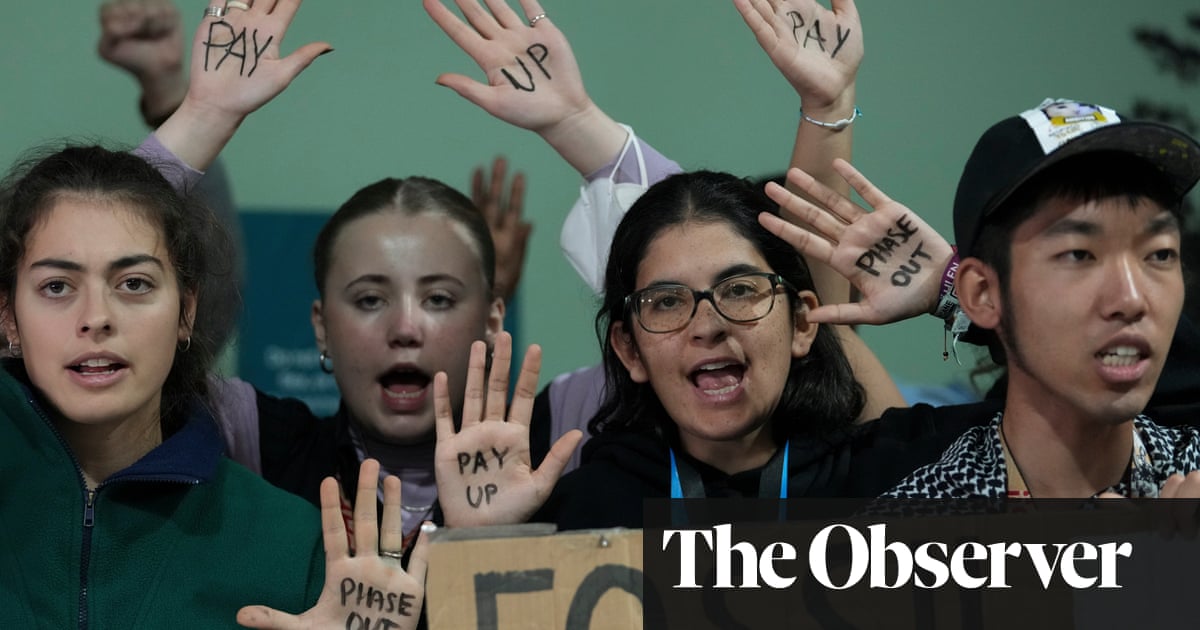Talks on a new trillion-dollar global deal to tackle the climate crisis dragged on late into Saturday night, as rich and poor countries fought over how much cash was needed, and who should pay.
Rich countries want to offer only about $300bn out of the $1.3tn a year needed from their own coffers, with the rest to come from other sources including potential new taxes and private investors.
Poor countries said this was too little, and relying on loans or the private sector would push them further into debt. Ali Mohamed, Kenya’s climate change envoy, representing the African group of negotiators, said grants and loans at very low interest rates from developed countries should make up $600bn of the money needed. “Anything lower than that will not help the world tackle climate change,” he said.
There was drama throughout an intense Saturday of talks in Azerbaijan’s capital Baku, where the two-week Cop29 UN conference was supposed to finish on Friday night. Early in the morning, developed countries including the UK, the US and EU members were pushed into raising their offer from an original $250bn a year tabled on Friday, to $300bn. Poor countries argued for more, and in the early evening two groups representing some of the world’s poorest countries walked out of one key meeting, threatening to collapse the negotiations.
Mohamed Adow, director of the Power Shift Africa thinktank, said: “The moral compass of the world – the most vulnerable countries – have walked out after [the rich] failed to honour the promises they have made on climate finance.”
Ed Miliband, the UK energy secretary, cancelled his flight home and vowed to stay as long as it took to get a deal. “I’ve always said there is a will to get a deal but we need to find a way,” he told the Observer. “It is in our national self interest to work with others and tackle the climate crisis and I will stay as long as there is a chance to get an agreement.”
Saudi Arabia was widely accused of disrupting the talks throughout, and in an extraordinary development attempted to alter one key text without full consultation.
Eamon Ryan, Ireland’s environment minister, told the Observer: “It has been the fossil fuel interests that want to maintain the status quo. But the vast majority of the world recognise the status quo endangers us all.”
The host country, Azerbaijan, also came in for fierce criticism. Much of the practical responsibility for running the negotiations falls to the host presidency, such as ensuring that drafts of a possible deal are properly consulted on, and helping countries quickly identify their areas of common ground and disagreement, to craft a coherent package of measures.
Germany’s foreign minister, Annalena Baerbock, furiously accused the host country – a large oil and gas producer, which is dependent on fossil fuels for 90% of its exports – of favouring countries understood to be Saudi Arabia and its allies. “We will not allow the most vulnerable, especially the small island states, to be ripped off by the few rich fossil- fuel emitters who have the backing, unfortunately, at this moment of the president [of the Cop],” she said.
There was speculation that key aspects of a potential deal, such as reaffirming the “transition away from fossil fuels” that was the main outcome of last year’s Cop28 talks, would have to be postponed to a future meeting. That would infuriate many countries, rich and poor, frustrated by how the annual change of host helps countries that seek to block progress to unpick agreements made in previous years.
“It was clear from day one that Saudi Arabia and other fossil fuel-producing countries were going to do everything in their power to weaken the landmark Cop28 agreement on fossil fuels. At Cop29 they have deployed obstructionist tactics to dilute action on the energy transition,” said Romain Ioulalaen, of the pressure group Oil Change International.
after newsletter promotion
The US and China – the world’s two biggest economies, and biggest emitters of greenhouse gases – are normally key nations at the annual “conference of the parties” (Cop) under the UN Framework Convention on Climate Change. But neither played much of a public role in Baku, allowing other countries to drive the talks. The US delegation is still made up of officials from Joe Biden’s administration, but the looming presidency of Donald Trump cast a pall over their participation.
China is said to be not blocking the potential deal, which would see it contribute to climate finance for the poor world voluntarily, unlike rich countries that are obliged to provide cash.
Some weary observers were still hopeful of a deal as the clock ticked on late into the night in Baku, and a trickle of delegates filed out of the conference centre with cases and bags to catch their flights.
“The deal must deliver a transformative scale of finance that prioritises the urgent needs of communities bearing the brunt of the escalating climate crisis,” said Harjeet Singh, global engagement director for the Fossil Fuel Non-Proliferation Treaty Initiative. “True progress will be measured not by promises on paper, but by tangible support for the most vulnerable, ensuring that justice and equity remain at the heart of climate solutions.”
Additional reporting Dharna Noor and Patrick Greenfield in Baku

